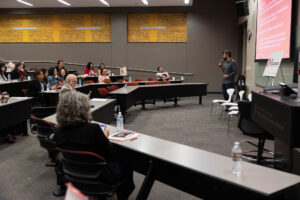Several journalism and journalism-related initiatives presented their steps forward, lessons learned and future projects during a panel entitled "Lightning session: Lessons and innovative cases," at the 16th Ibero-American Colloquium on Digital Journalism, on April 16.
Artificial intelligence (AI) is a topic that Chequeado's team has always worked with in Argentina. However, the progress it has made has meant new particular challenges for this news outlet that specializes in fact-checking, said Pablo Fernández, executive and news director of Chequeado.
According to the team's analysis, it will become increasingly difficult — for specialists and non-specialists alike — to differentiate which images are real. This could lead the public to feel a constant uncertainty about what is real and what is not. Fernandez shared some of Chequeado's strategies: , they always test tools as they come out, as has been the case with Dall-E, ChatGPT or Synthesis. They also participate in public forums to know what is happening and are present on all platforms.
"We have to learn just as fast [as artificial intelligence]. And how we learn: Read, check yourself and see what’s happening," Fernández said. He added that all this work has an ultimate goal, which is to be able to educate the public.

Florencia Aza, from Sembramedia, during the Ibero-American Colloquium on Digital Journalism. (Photo: Patricia Lim/ Knight Center)
Sembramedia's experience with digital native media led Florencia Aza, director of the organization's strategy initiative, to share three lessons learned that can improve the operation of journalism start-ups.
The first is that although the founder should bear all responsibilities, the news outlet should run like any other organization with clear processes and roles, and especially with a work plan. Money is key to making the outlet work, but Aza explained that the organization also needs the human touch. At Sembramedia, she said, they have strived to create community and provide support when needed. Finally, she said that although the business model must lead the company, the outlet must work in four other areas — audience development, innovation and technology, management, and leadership.
Aza culminated her presentation with two findings from Sembramedia's "Tipping Point" study, having to do with media sustainability. She said that incorporating people with expertise in other areas such as sales, marketing and innovation, and technology translates into higher revenue. News outlets with sales experts had five to nine times higher revenue than those without. The study also found that news outlets with a technology and/or innovation expert had three times more revenue, even without a sales person.
"It is super necessary to start diversifying those roles, incorporating other fields such as sales, marketing, and teach them what we need as a news outlet," Aza said.
From Honduras, Catherine Calderón, co-founder of Contracorriente, spoke in general about the news outlet’s research areas and what they’ve achieved in six years since its creation. The Contracorriente team was conceived from the beginning as a diverse team (both in terms of gender and age). Seeking to reach the widest audience, Contracorriente has ventured into almost all platforms and social media (Twitter, Whatsapp) and in all journalistic formats — video, audio, text, and even infographics and memes.
One of its first specials was about the 2017 elections when Juan Orlando Hernández, former president who is now imprisoned in New York accused of drug trafficking, was a candidate.
"That's when we understood that our mission was really well written, because we were betting on creating a new generation of journalists and storytellers in Honduras. We don't want to see ourselves as a news outlet doing journalism. We are documenting history," Calderón said.
In addition to these specials, Calderón highlighted two partnerships: Redacción Regional and the Latin American Center for Investigative Journalism. The goal is to be able to tell the story not only of Honduras, but of Central America. Finally, she highlighted audience participation in the news outlet as such — its audience has written 23 articles, 44 short stories and 14 crónicas [literary long-form journalism]. All of this with editorial support from the Contracorriente team.
With a different perspective, Fernando Díaz talked about Newspack, an open source WordPress platform made up of 24 engineers. Launched in 2019, Díaz said that Newspack seeks to help media not only with an editorial build-up process, but with applications that may allow them to improve revenue.
Díaz pointed out that they seek to give news outlets tools to create content, to create donation processes, manage engagement, among other strategies to promote sustainability. They currently work with 200 news outlets in nine languages. Of these, more than 15 outlets are in Spanish or Portuguese. He said that news outlets such as Insight Crime, La Silla Vacía and Efecto Cocuyo will be added this year.
"We are learning a lot about the challenges that you [news outlets] face, not only in terms of obstacles on how to pay or how to accept donations, but also issues such as blocking," Díaz said. He added that, especially on this issue, they are learning from mirror sites to avoid blocking. "So we are willing, very interested in being able to continue expanding and helping the media in Latin America."
Summer Harlow, associate professor at the University of Houston, spoke about her research and book focused on Latin American digital native news outlets. Harlow found it interesting to analyze these outlets because, although they were different from traditional media, they could not be labeled as activists.
These digital native media are characterized by covering neglected issues by publishing the voices of Indigenous communities, women, the LGBTQ+ community, among others. They are especially critical, Harlow said, among other reasons because they are not financially dependent on governments or large corporations. Instead, Harlow noted, they establish other "interesting" ways of raising resources: crowdfunding campaigns, memberships, merchandise (T-shirts, documentaries, etc.), events, and she even mentioned a news outlet that has a Café.
Another interesting issue is the relationship that these news outlets have with their audiences, which leads to a more innovative use of social media, and the identity of journalists who are part of these outlets. "They say 'we are journalists, but we are doing something different, we are doing better journalism, we are doing a different kind of journalism.' But they say that, although it is different, although it is better, it’s not activism. But at the same time, they are saying 'we are doing something that defends human rights and is trying to change the world."
Factchequeado, an initiative of Maldita.es and Chequeado focused on fact-checking for the U.S. Hispanic and Latino audience, also had a presence at the Colloquium. Back on stage, Pablo Fernández spoke about achievements during the first year of the Factchequeado initiative, launched coincidentally during the 2022 Colloquium. For example, he said that it went from having seven partners to 44.

Pablo Fernández, from Chequeado. (Photo: Patricia Lim / Knight Center)
According to Fernández, in addition to increasing their partners — who republish the fact-checking made by the news outlet — they have also been republished by more traditional media such as The New York Times, CNN, Washington Post, among others.
To achieve its impact, it has relied on Whatsapp, "because that's where the audience is." For this year and on the eve of the coming U.S. elections, their main goal is to add more partners, especially in the central states of the country, where their fact-checking hardly reaches. They also seek to build knowledge through research that will allow them to understand the phenomenon of disinformation in the U.S. and offer better alternatives to the community. Finally, Factchequeado provides training to its partners so they have "antibodies" to face disinformation.
Luis Martínez, of the Mexican Media Observatory, explained how this initiative, as opposed to determining what is true, has focused part of its project on identifying those news outlets that are misinforming. Through a study of 1,400 digital news outlets in the country and a diagnosis based on more than 30 variables, the Observatory catalogs a news outlet as either an impostor, a propagandist, an explainer, among other categories.
Martínez pointed out that it’s not about accusing a news outlet of being fake, but it is part of one of the goals of the Observatory, which has to do with regaining the audience’s trust.
"We need to revalue the media, we need them to be valued and, on the other hand, we also need audiences and the media to better manage their techniques. On the other hand, audiences also need to understand the value of making news," Martínez said.
In addition to the credibility crisis on the part of the audience, the journalism industry also has a crisis in the new generation of journalists: they do not see a future in the midst of this lack of trust, job insecurity and even violence by polarized societies. This was explained by Jordy Meléndez, co-director of Factual and the Latam Network of Young Journalists.
"At Factual, we believe it’s possible to transform the industry from within. And we’re also convinced that we’re not only fighting for attention. [...] It’s not only against other news outlets. I believe it’s true, but we are also in a fight for trust," Meléndez said.
For this reason, Red Latam seeks to empower the youngest talent in the region, through training, as well as collaborative journalism processes that have led to international award-winning investigations. But it also seeks to "combat a precarious industry." Factual, in alliance with other organizations, has hired 104 journalists for different research projects and 12 are part of Factual's staff.
The panel closed with a topic that should be intersectional to any initiative: mental health. "I must tell you that if we don't take care of ourselves, there will be no more journalism," said Mar Cabra, co-founder of The Self Investigation initiative, which seeks to promote a healthy culture in newsrooms.
Cabra talked about her experience. After being a very active journalist and receiving a Pulitzer Prize, along with colleagues, for her work on the Panama Papers (through the International Consortium of Investigative Journalists), she realized that she could not take it anymore.
"In the end, [my body] had to take away my mental power and passion. I haven't gone back to journalism since I quit in 2017, when I had to stop. And I would like, when I listen to you, that the same thing doesn't happen to you," she said. "The future of journalism needs healthy journalists. And that’s what we do at the foundation [...] to support all of you."
Cabra sees as positive that journalism is undergoing a revolution to take care of mental health as it should, but there is still a long way to go. She called for the use of available tools, some of which are free, through her foundation and even courses such as those offered by the Knight Center, which are available on its distance learning platform.
"There’s only one thing left for me to say, and that is not to forget there’s something free you can do at any time: make a pause, even if it is only for a couple of minutes. Don't forget to take breaks, because it’s very important," she said.